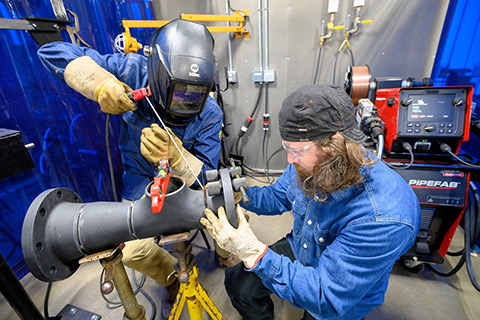Pipefitter

Quick Facts
- Pathway: Business & Industry
- Campus: South
Pipefitters install and repair pipe systems and pipelines that carry water, steam, air, or other liquids or gases.
Explore on This Page
Job Titles & Career Info
Our Program
Why Choose Pipefitter?
- Help keep cities & towns running by maintaining water, sanitation & heating, ventilation & air conditioning (HVAC) systems
- Build skills you can use in a variety of settings
- Enter a filed with high Industry growth rate
- Prepare to enter the workforce in a short amount of time
Prepare for What You Will Do at Work
- Troubleshoot & solve problems in pipe systems
- Inspect mechanical piping systems
- Select construction materials & make parts
- Read, interpret & sketch piping
- Assess damages
Marketable Skills You Will Learn
- Critical thinking
- Reasoning
- Communication
- Personal & social responsibility
- Teamwork
- Computer literacy
Before You Enroll, Think About:
- You will be working with your hands to carry out solutions to piping problems
- You can use design, mechanical & construction skills in your work
- Some personality traits or skills that will help you succeed in your work as a pipefitter include:
- Attention to detail
- Dependability
- Manual dexterity
Need a boost to get ready for college?
Talk to your advisor about Developmental Studies if your TSI scores say you need some help in math or reading and writing.
Degrees & Certificates
Degree
Certificates
Level 1
Continuing Education Program
How Much Time & Money to Finish?
2024–2025 Academic Year
| Degree or Certificate | Program Title | Semester Credit Hours | Total Tuition & Fees |
|---|---|---|---|
| AAS | Pipe Fitter | 60 | $4,440 |
| CRT1 | Pipefitting—Basic | 18 | $1,332 |
| CRT1 | Pipefitting—Advanced | 20 | $1,480 |
Notes:
- Tuition is based on in-state, in-county rates.
- Totals do not include textbooks and other materials.
Continuing Education Programs
Time commitments and fees vary depending on the course.
Earn More Choices & More Money
Transfer to a college or university to continue your studies. Earning a bachelor’s degree opens the door to career and promotion opportunities.
Next steps
- Talk to your advisor about planning for transfer
- Explore transfer schools
Start on Your Pathway!
Contact
Updated December 02, 2024
